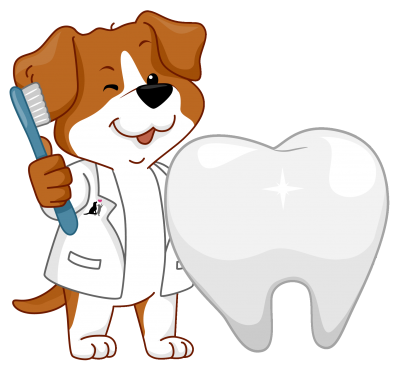Proactive Dental Health For Puppies
 Proactive Dental Care Starts With Your Pet’s First Visit
Proactive Dental Care Starts With Your Pet’s First Visit
On your puppy’s first visit, we will do a nose-to-tail exam that includes looking inside your little one’s mouth. While we often think of dental problems being an issue later in life, unfortunately, there are many painful and concerning dental abnormalities that can impact the quality of your young pet’s life. These abnormalities can set them up for major dental disease in the future if not addressed early and effectively.
Oral Exams Help Get Puppies off to a Great Start
We get new puppies off to a great start in life with included oral care exams at every vet visit, starting with their very first. We can readily see a lot of what’s visible above the gum line, but we can’t see what’s hiding underneath—for that we need dental x-rays.
Your Puppy’s First COHAT
Between 6 months and 12 months of age, we recommend the first Complete Oral Health Assessment and Treatment (COHAT) under anesthesia which includes Full Mouth Series Dental X-rays. This provides an oral status baseline. We can then determine if there are any immediate issues to address or potential issues to monitor as your pet grows. It is optimal to do this in conjunction with your pet’s spay or neuter, unless you are delaying either for reasons you and your vet have discussed.
Is Your Pet’s Breed Prone to Oral Health Issues?
Toy and small breed dogs; brachycephalic smooshy-faced breeds such as English Bulldogs, French Bulldogs, Pugs, Boston Terriers; and certain other breeds like Greyhounds and Dachshunds are particularly prone to dental problems. This first professional complete dental evaluation while under anesthesia is important for all dogs, but it is especially important for high risk breeds prone to significant dental issues.
What We Look for in the Oral Exam & Dental X-Rays under Anesthesia
Broken Baby Teeth – These need to be addressed as quickly as possible as they are very painful and often become infected causing major risk of damage to the underlying permanent teeth, sinuses, as well as, surrounding soft tissue and bone.
Primary Tooth Retention – This occurs when baby teeth don’t fall out at the appropriate time often causing two teeth to occupy a space meant for only one tooth. If treatments, such as extraction of problem-persistent baby teeth, aren’t done early enough, the permanent teeth can erupt in the wrong place and cause damage to the tongue, palate, gums or other teeth. This significantly increases periodontal disease, as plaque, calculus, food and debris become trapped between the crowded teeth.
Missing Teeth – Sometimes pets are born without all their adult teeth (42 in dogs). This is not uncommon or a problem for most pets. However, fractured teeth with retained tooth roots or unerupted adult teeth can cause severe pain, infection, or jaw bone fractures due to dentigerous cysts if not properly extracted.
Dentigerous cysts are the second most common type of odontogenic cyst, which is a fluid-filled sac that develops in the jaw bone and soft tissue. They form over the top of an unerupted tooth, or partially erupted tooth, usually one of your molars or canines.are the second most common type of odontogenic cyst, which is a fluid-filled sac that develops in the jaw bone and soft tissue. They form over the top of an unerupted tooth, or partially erupted tooth, usually one of your molars or canines.
Malocclusion (Abnormal Bite) – This can cause significant issues with the closely interlocking teeth in your pet’s mouth. If baby or adult teeth contact opposing teeth or soft tissue of the gums, palate, lips, cheeks, or tongue, this can be quite painful and lead to a head-shy, lethargic, and unhappy pet. Malocclusions can also make it difficult for your puppy to eat normally, putting them at risk of malnourishment or stunted growth.
Crowding or Malpositioned (Crooked) Teeth – Crowding and abnormally rotated teeth can dramatically increase the risk of periodontal disease (inflammation, infection, and bone loss, leading to tooth loss). Taking care of this early in life (sometimes recommending strategic extraction of smaller teeth to preserve adjacent larger and more functional teeth) will be a huge benefit for your pet’s oral comfort and health.
Harmony Animal Hospital is VERY PASSIONATE about your pet’s oral health because we know oral disease seriously impacts your pet’s quality of life and longevity.
Oral disease and pain are often hidden all-to-well by pets. It is our job—ours as their caring veterinarian and yours as their pet parent—to be proactive and diligent about checking for, preventing, and addressing any problems that arise in their mouths.
To start your pet off on the right paw and keep them there, we advocate for:
- Dental home care
- Oral exams (included) at every exam visit
- Regular professional dental COHATs


